Spanish translation below /traducción en español abajo
Ag Education Manager Sara Katz on What Grows in Kingston
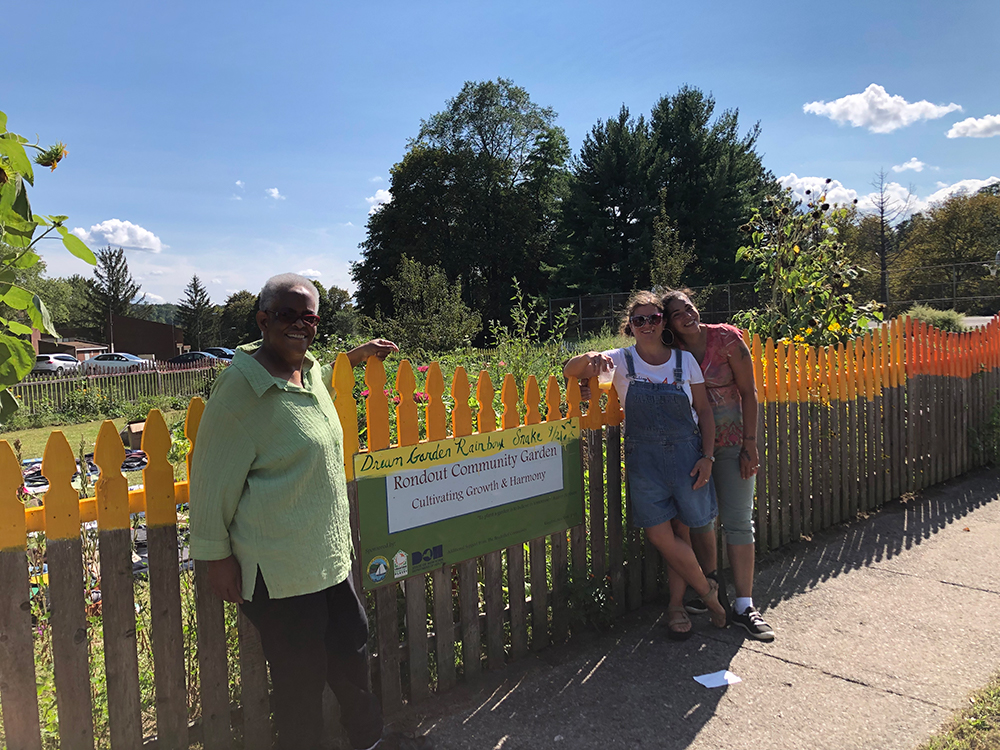
How can a farm be of service to its community? What can people accomplish when they come together as a collective? This photo-centric feature explores our collaboration with Grow Well Kingston, a network of gardeners, farmers, nonprofit workers and Kingston residents, that formed early in the pandemic to address community access to nature and gardening. As the Farm Hub continues to make connections in service to the Kingston community, our Agricultural Education and Training Program staff joined the collective in hopes of offering agricultural expertise and resources to the initiative.
Grow Well evolved over a series of ad hoc community Zoom meetings held during the Covid-19 shut down, bringing organizations and individuals together around the topics of community gardening and urban farming. But, the real roots of this work were already on the ground, at places like the Kingston YMCA Farm Project, where youth grow and sell fresh vegetables on a one third acre farm, gaining job skills, community service and leadership experience outside of the classroom. The work is also visible at places like Rondout Gardens, one of the oldest community gardens in Kingston (at the housing complex of the same name), where a garden replaced an aging and unsafe playground back in the 1990s, through the organizing efforts of its residents. Identifying what was already out there in terms of growing spaces and local resources was a key first step in Grow Well’s planning.
The Kingston Garden Bed Project
Since early spring of 2020, Grow Well helped initiate the Kingston Garden Bed Project, in which youth from the YMCA Farm Projcect, Hudson Valley Farm Hub staff, and adult volunteers have installed over 70 raised garden beds in the community, providing soil, plants and mentoring assistance to residents. Together, the collective built gardens in backyards, within community gardens for renters and homeowners, and at community organizations. The gardens not only provided food for individuals but connected them with their community.
At Ulster Immigrant Defense Network, children tended tomatoes and kale plants at neighborhood church plots. One garden, planted along a white picket fence in a front yard was created simply to provide free food to passersbys in a time of need. Another sunny backyard plot sits next to some chickens a boy was tending for 4-H behind his apartment; the garden is his next agricultural venture.
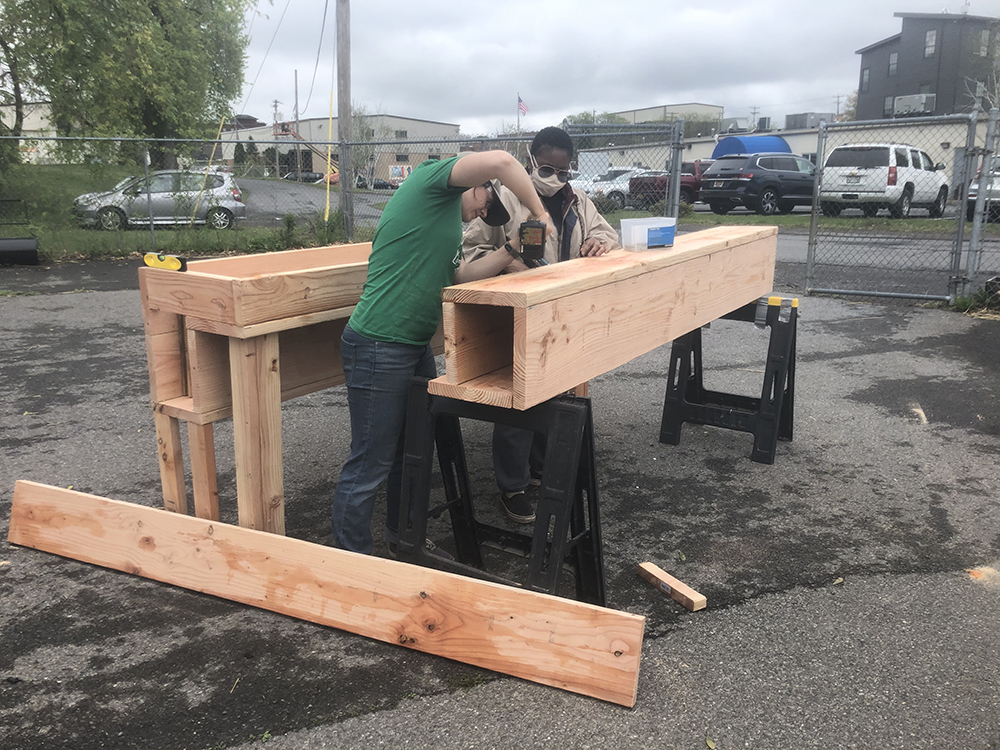
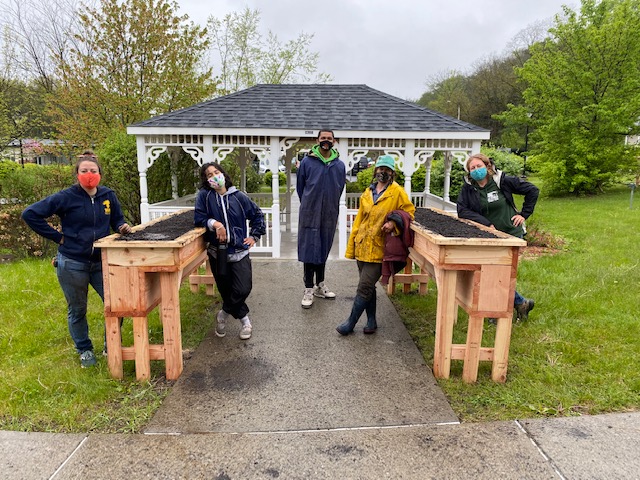
Rainwater Harvesting Infrastructure
In spring of 2021, Grow Well members applied for and received a grant from the New York State Department of Agriculture and Markets. Building upon the motivation the youth had for light carpentry, we decided to take it to the next level with a building project – the construction of two rainwater harvesting shade structures. Rainwater capture and storage, an element of green infrastructure, not only conserves a precious resource, but can model for the community a relatively low-technology element of the built environment. The youth worked with the Farm Hub’s construction team to pour concrete footings and build a platform for a water storage tank. The system will water fruit trees and a rain garden adjacent to the YMCA’s new playground. “I appreciated doing a project out in the community, and was inspired to see hardworking teens, some of whom seemed to take a genuine interest in carpentry and construction,” said Jay Krauer a mechanic at the Farm Hub. He conducts regular maintenance on the Farm Hub’s buildings, and has worked in construction for many years, specializing in interior finish carpentry.
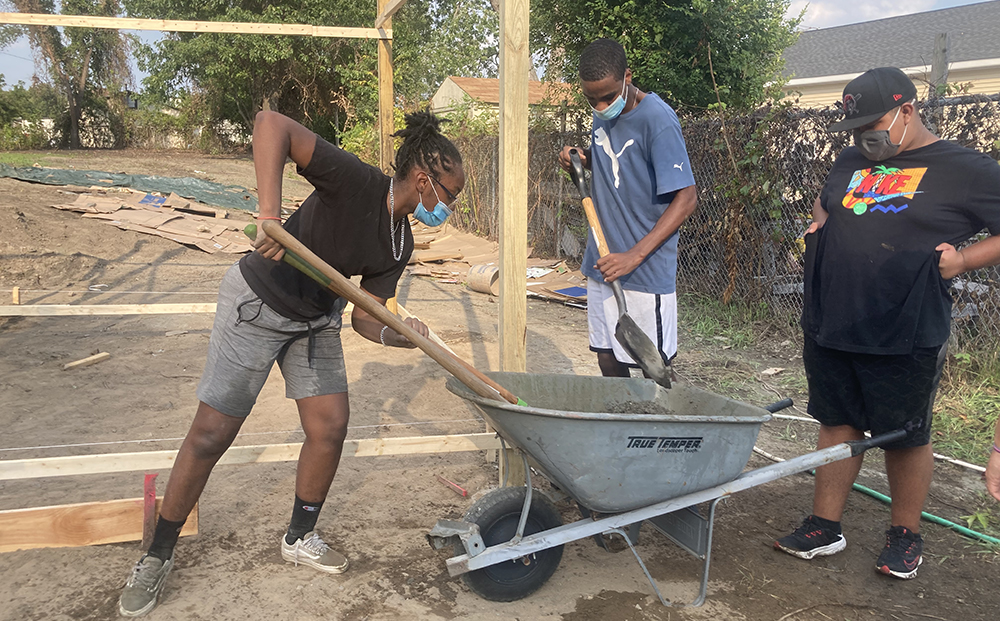
Community Gardens
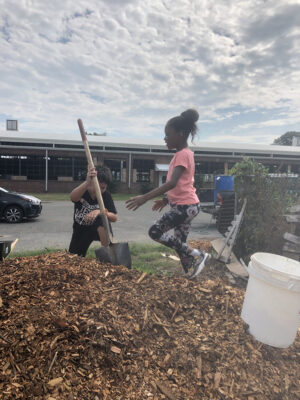
At the center of a collective are people. There are gardeners, like Cindy Muro, who’s retired from managing the greenhouses at Mohonk Mountain House, and has been a volunteer coordinator with the school garden at George Washington elementary school for several years. This year, she expanded her reach to revitalize the community garden at Barmann Park. Located across the street from the Boys & Girls Club, Cindy got the children involved in the garden through their summer camp programming. On a very hot, late summer day, I lugged wheelbarrows of woodchips around the garden, as the kids plucked Sungold tomatoes from the plots and watered a small watermelon that was emerging from the straw. The campers were already familiar with Barmann Park, playing kickball there and having cookouts. The experience of gardening there would hopefully deepen their experience of the place, as the kids learned where our food comes from, and the hard work it takes to grow it.
At the center of a collective is a network of community members who are willing to make connections every step of the way. Erica Brown, a community resident who works at Radio Kingston, has helped Grow Well to develop and communicate its message through public service announcements and presence at community events; she also partnered with Kingston Library to jumpstart a garden tool lending program. I highlight Erica’s contribution to Grow Well, but many other folks offer administrative support, funding, land access, gardening expertise, and volunteer time. Grow Well is now a Focus Team of the Live Well Kingston Commission, coordinated by the City of Kingston’s Health and Wellness Department.
The Grow Well collective identified values they wanted uphold while supporting urban agriculture. Included was a goal of undoing racism. With those lenses, they have attempted to center BIPOC voices and experimented with structures to welcome community members. The work is ongoing and they welcome feedback and new members.
Together, we will continue to Grow Well in Kingston.
To learn more about Grow Well, or to get involved, please visit https://livewellkingston.org/grow-well/ and visit www.facebook.com/groups/growwell
Sara Katz, Gerente de Educación Agrícola, sobre lo que se cultiva en Kingston

¿Cómo puede una granja servir a su comunidad? ¿Qué pueden lograr las personas cuando se unen como colectivo? Esta presentación con fotografías explora nuestra colaboración con Grow Well Kingston, una red de jardineros, agricultores, trabajadores de organizaciones sin fines de lucro y residentes de Kingston que se formó al principio de la pandemia para aumentar el acceso de la comunidad a la naturaleza y los jardines. Como parte del esfuerzo continuo de Farm Hub en conectar en servicio a la comunidad de Kingston, el personal de nuestro Programa de Educación y Capacitación Agrícola se unió al colectivo con la esperanza de ofrecer experiencia y recursos agrícolas a la iniciativa.
Grow Well se desarrolló en una serie de reuniones comunitarias ad hoc por Zoom durante el cierre por el Covid-19, reuniendo a organizaciones e individuos en torno a los temas de la jardinería comunitaria y la agricultura urbana. Pero en realidad las raíces de este trabajo ya estaban establecidas, en sitios como Kingston YMCA Farm Project, donde los jóvenes cultivan y venden vegetales frescos en una granja de un tercio de acre, adquiriendo destrezas laborales, servicio comunitario y experiencia de liderazgo fuera del aula. Este trabajo también es visible en lugares como Rondout Gardens, uno de los jardines comunitarios más antiguos de Kingston (en el complejo de viviendas del mismo nombre), donde un jardín reemplazó a un parque de recreo envejecido e inseguro en la década de 1990, gracias a los esfuerzos de organización de sus residentes. Identificar lo que ya existía en términos de espacios de cultivo y recursos locales fue un primer paso clave en la planificación de Grow Well.
The Kingston Garden Bed Project
Desde principios de la primavera de 2020, Grow Well ayudó a iniciar el proyecto de jardines Kingston Garden Bed Project, en el que los jóvenes de YMCA Farm Projcect, personal de Hudson Valley Farm Hub, y voluntarios adultos han instalado más de 70 bancales de jardín elevados en la comunidad, proporcionando tierra, plantas y orientación a los residentes. Juntos, el colectivo construyó jardines en patios traseros, dentro de jardines comunitarios para inquilinos y propietarios de viviendas, y en organizaciones comunitarias. Los jardines no solo brindaron alimentos a las personas, sino que las conectaron con su comunidad.
En Ulster Immigrant Defense Network, los niños cuidaron tomates y col rizada en las huertas de las iglesias del vecindario. Un jardín, plantado a lo largo de la valla blanca frente a un patio delantero, se creó simplemente para proporcionar comida gratis para los transeúntes en un momento de necesidad. Hay otra huerta soleada en el patio trasero junto a unas gallinas que un niño estaba cuidando para 4-H detrás de su apartamento; el jardín es su próxima aventura agrícola.


Infraestructura de recolección de agua de lluvia
En primavera de 2021, los miembros de Grow Well solicitaron y recibieron una subvención del Departamento de Agricultura y Mercados del Estado de Nueva York. Partiendo de la motivación que los jóvenes tenían para la carpintería ligera, decidimos llevarla al siguiente nivel con un proyecto de construcción – construyendo dos estructuras de cobertizo para la recolección de agua de lluvia. La captación y almacenamiento del agua de lluvia, un elemento de la infraestructura verde, no solo conserva un recurso precioso, sino que puede mostrar a la comunidad un elemento de relativamente baja tecnología del entorno construido. Los jóvenes trabajaron con el equipo de construcción del Farm Hub en verter bases de concreto y construir una plataforma para un tanque de almacenamiento de agua. El sistema regará árboles frutales y un jardín de lluvia adyacente al nuevo patio de recreo de la YMCA. “Aprecié hacer un proyecto en la comunidad, y me inspiró ver a adolescentes trabajadores, algunos de los cuales parecían tener un interés genuino en la carpintería y la construcción”, dijo Jay Krauer, un mecánico en el Farm Hub. Se encarga del mantenimiento regular de los edificios del Farm Hub, y ha trabajado en la construcción durante muchos años, especializándose en carpintería de acabado interior.

Jardines Comunitarios

En el centro de un colectivo están las personas. Hay jardineras, como Cindy Muro, que se retiró de administrar los invernaderos en Mohonk Mountain House, y ha sido la coordinadora de voluntarios con el huerto escolar en la escuela primaria George Washington durante varios años. Este año, amplió su alcance para revitalizar el jardín comunitario en Barmann Park. Situado al otro lado de la calle del Boys & Girls Club, Cindy involucró a los niños en el jardín como parte de su programación de campamento de verano. Un día muy caluroso de finales del verano, cargué carretillas de astillas de madera por del jardín, mientras los niños cosechaban tomates Sungold de la huerta y regaban una pequeña sandía que estaba emergiendo de la paja. Los niños del campamento ya tenían familiaridad con Barmann Park, por jugar kickball y hacer barbacoas allí. La experiencia de cultivar allí, con suerte, profundizaría su experiencia del lugar, aprendiendo de dónde viene nuestra comida y el gran trabajo que se necesita para cultivarla.
En el centro de un colectivo hay una red de miembros de la comunidad que están dispuestos a hacer conexiones en cada paso del camino. Erica Brown, una residente de la comunidad que trabaja en Radio Kingston, ha ayudado a Grow Well a desarrollar y comunicar su mensaje a través de anuncios de servicio público y con su presencia en eventos comunitarios; también colaboró con la Biblioteca de Kingston para poner en marcha un programa de préstamo de herramientas de jardín. Destaco la contribución a Grow Well de Erica, pero muchas otras personas ofrecen apoyo administrativo, financiamiento, acceso a la tierra, experiencia en jardinería y tiempo de voluntariado. Ahora, Grow Well es un Equipo Enfocado de la Comisión de Buen Vivir Kingston (Live Well Kingston Commission), coordinado por el Departamento de Salud y Bienestar de la Ciudad de Kingston.
El colectivo Grow Well identificó valores que querían defender mientras apoyaban la agricultura urbana. Se incluyó el objetivo de deshacer el racismo. Con ese análisis, han intentado centrar las voces de personas BIPOC y han experimentado con estructuras para dar la bienvenida a los miembros de la comunidad. El trabajo sigue y agradecen los comentarios y los nuevos miembros.
Juntos, continuaremos creciendo con Grow Well en Kingston.
Para obtener más información sobre Grow Well, o para participar, visite https://livewellkingston.org/grow-well/ and visit www.facebook.com/groups/growwell
